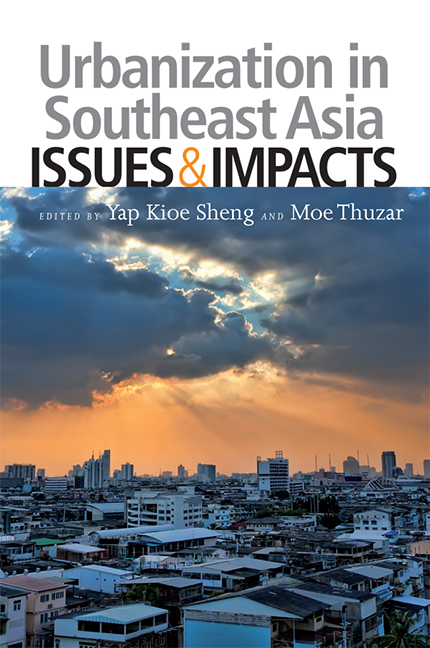Book contents
- Frontmatter
- Contents
- Message from Head, ASEAN Studies Centre
- Message from Director, Centre for Liveable Cities
- About the Contributors
- Introduction
- Urbanization in Southeast Asian Countries: Recommendations
- 1 The Challenges of Promoting Productive, Inclusive and Sustainable Urbanization
- Cities as Engines of Development
- Inclusive Cities
- Cities and the Environment
- Governance, Decentralization, and Urbanization
- Urbanization from an ASEAN Perspective
- 15 Promoting an Integrated Approach to Urbanization in ASEAN Countries
- Index
15 - Promoting an Integrated Approach to Urbanization in ASEAN Countries
from Urbanization from an ASEAN Perspective
Published online by Cambridge University Press: 21 October 2015
- Frontmatter
- Contents
- Message from Head, ASEAN Studies Centre
- Message from Director, Centre for Liveable Cities
- About the Contributors
- Introduction
- Urbanization in Southeast Asian Countries: Recommendations
- 1 The Challenges of Promoting Productive, Inclusive and Sustainable Urbanization
- Cities as Engines of Development
- Inclusive Cities
- Cities and the Environment
- Governance, Decentralization, and Urbanization
- Urbanization from an ASEAN Perspective
- 15 Promoting an Integrated Approach to Urbanization in ASEAN Countries
- Index
Summary
When an integrated regional approach on addressing urbanization in ASEAN countries is being considered, the question that most readily comes to mind is why a regional approach is necessary for this issue. Past practice in ASEAN has not shown that the association's members feel an urgent need to tackle the issue regionally. Urbanization is still largely seen as a national responsibility rather than an issue with regional implications. When the topic does come up for discussion, there is a tendency to dismiss its cross-sectoral relevance.
It would be relevant to bear in mind, however, the role of regional institutions in pushing action at national levels. Dua and Esty (1997) highlight that the regional level represents a critical middle ground between global and national scales. Regional cooperation mechanisms — by their very nature, a peer process — can thus facilitate the formulation and implementation of necessary policies and measures at several levels, including the national and subregional. Although referring to environmental governance, Kimball (1999) has made the same emphasis on regional systems (of environmental management) being “essential” to securing agreements for, and implementation of, specific action programmes.
The challenge here is whether urbanization presents the same imperative for action and “management”. Koh and Robinson (2002) argue that ASEAN does not have a core bureaucracy, with its permanent secretariat in Jakarta playing a largely limited role in facilitating the implementation of regional agreements. However, with the entry into force of the ASEAN Charter in December 2008, there is a wider scope for the ASEAN Secretary-General and officers of the ASEAN Secretariat “to facilitate and monitor the progress in implementation of ASEAN agreements and decisions” (Article 11, paragraph 2). The Protocol (1992) amending the 1976 Agreement on the Establishment of the ASEAN Secretariat details the functions and powers of the Secretary-General, including to “initiate, advise, coordinate and implement ASEAN activities” and “develop and provide the regional perspective on subjects and issues before ASEAN”.
This indicates the existence of a window for ASEAN to consider urbanization issues as part of the regional cooperation agenda. The question then arises as to which among the plethora of ASEAN meetings and mechanisms would take up the challenge, or whether setting up a new regional mechanism is feasible.
- Type
- Chapter
- Information
- Urbanization in Southeast AsiaIssues and Impacts, pp. 361 - 372Publisher: ISEAS–Yusof Ishak InstitutePrint publication year: 2012



